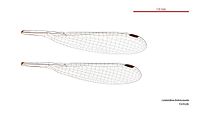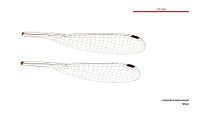Lestoidea brevicauda
Appearance
| Short-tipped bluestreak | |
|---|---|
| Scientific classification | |
| Domain: | Eukaryota |
| Kingdom: | Animalia |
| Phylum: | Arthropoda |
| Class: | Insecta |
| Order: | Odonata |
| Suborder: | Zygoptera |
| Family: | Lestoideidae |
| Genus: | Lestoidea |
| Species: | L. brevicauda
|
| Binomial name | |
| Lestoidea brevicauda Theischinger, 1996[2]
| |

| |
Lestoidea brevicauda is a species of Australian damselfly in the family Lestoideidae,[3] commonly known as a short-tipped bluestreak.[4] It is endemic to north-east Queensland, where it inhabits streams in rainforest.[5]
Lestoidea brevicauda is a medium-sized to large damselfly, dark coloured with dull orange to greenish markings.[4]
Etymology
[edit]The species name brevicauda is derived from two Latin words: brevis meaning short; and cauda meaning tail. In 1996 Theischinger named this species with regard to the short appendages at the tip of the male abdomen.[2][6]
Gallery
[edit]-
Female wings
-
Male wings
See also
[edit]References
[edit]Wikimedia Commons has media related to Lestoidea brevicauda.
Wikispecies has information related to Lestoidea brevicauda.
- ^ Dow, R.A. (2017). "Lestoidea brevicauda". IUCN Red List of Threatened Species. 2017: e.T87534518A87539964. doi:10.2305/IUCN.UK.2017-1.RLTS.T87534518A87539964.en. Retrieved 20 November 2021.
- ^ a b Theischinger, G. (1996). "The species of Lestoideinae Munz (Insecta: Odonata: Zygoptera: Lestoideidae)" (PDF). Linzer Biologische Beiträge. 28 (1): 315–324 [318].
- ^ "Species Lestoidea brevicauda Theischinger, 1996". Australian Faunal Directory. Australian Biological Resources Study. 2012. Retrieved 11 April 2017.
- ^ a b Theischinger, Günther; Hawking, John (2006). The Complete Field Guide to Dragonflies of Australia. Collingwood, Victoria, Australia: CSIRO Publishing. p. 40. ISBN 978-0-64309-073-6.
- ^ Theischinger, Gunther; Endersby, Ian (2009). Identification Guide to the Australian Odonata (PDF). Department of Environment, Climate Change and Water NSW. p. 223. ISBN 978-1-74232-475-3.
- ^ Endersby, I. (2012). "Watson and Theischinger: the etymology of the dragonfly (Insecta: Odonata) names which they published". Journal and Proceedings of the Royal Society of New South Wales. 145 (443 & 444): 34–53 [38]. ISSN 0035-9173 – via Biodiversity Heritage Library.



